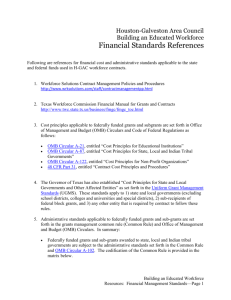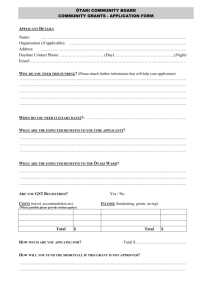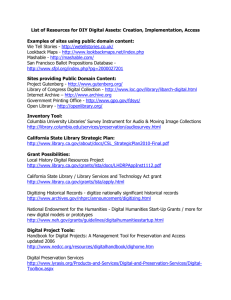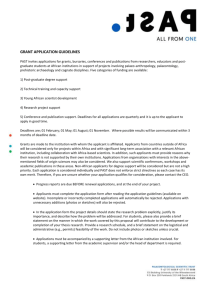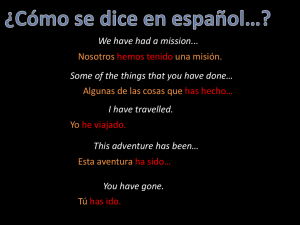Terms of grant awards
advertisement
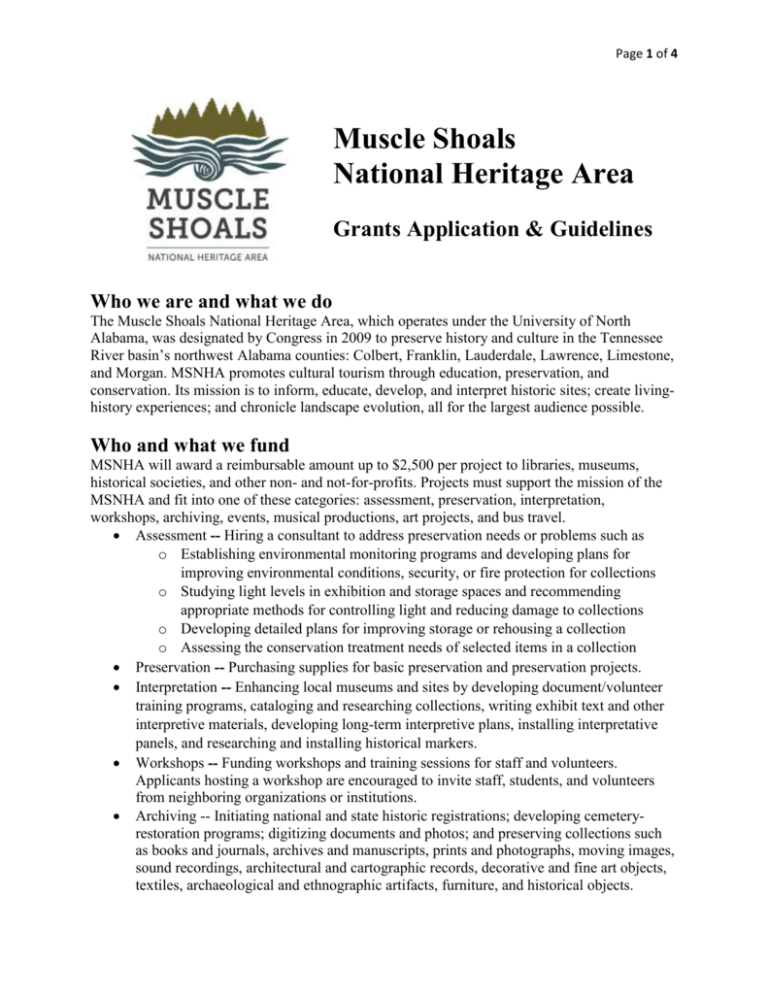
Page 1 of 4 Muscle Shoals National Heritage Area Grants Application & Guidelines Who we are and what we do The Muscle Shoals National Heritage Area, which operates under the University of North Alabama, was designated by Congress in 2009 to preserve history and culture in the Tennessee River basin’s northwest Alabama counties: Colbert, Franklin, Lauderdale, Lawrence, Limestone, and Morgan. MSNHA promotes cultural tourism through education, preservation, and conservation. Its mission is to inform, educate, develop, and interpret historic sites; create livinghistory experiences; and chronicle landscape evolution, all for the largest audience possible. Who and what we fund MSNHA will award a reimbursable amount up to $2,500 per project to libraries, museums, historical societies, and other non- and not-for-profits. Projects must support the mission of the MSNHA and fit into one of these categories: assessment, preservation, interpretation, workshops, archiving, events, musical productions, art projects, and bus travel. Assessment -- Hiring a consultant to address preservation needs or problems such as o Establishing environmental monitoring programs and developing plans for improving environmental conditions, security, or fire protection for collections o Studying light levels in exhibition and storage spaces and recommending appropriate methods for controlling light and reducing damage to collections o Developing detailed plans for improving storage or rehousing a collection o Assessing the conservation treatment needs of selected items in a collection Preservation -- Purchasing supplies for basic preservation and preservation projects. Interpretation -- Enhancing local museums and sites by developing document/volunteer training programs, cataloging and researching collections, writing exhibit text and other interpretive materials, developing long-term interpretive plans, installing interpretative panels, and researching and installing historical markers. Workshops -- Funding workshops and training sessions for staff and volunteers. Applicants hosting a workshop are encouraged to invite staff, students, and volunteers from neighboring organizations or institutions. Archiving -- Initiating national and state historic registrations; developing cemeteryrestoration programs; digitizing documents and photos; and preserving collections such as books and journals, archives and manuscripts, prints and photographs, moving images, sound recordings, architectural and cartographic records, decorative and fine art objects, textiles, archaeological and ethnographic artifacts, furniture, and historical objects. Page 2 of 4 Events – Presenting living-history events such as concerts, reenactments, plays, period banquets, walking tours, and period balls. Musical productions and art projects – Presenting performances and showings related to MSNHA’s historical and cultural themes and open to the public. Bus travel – Transporting groups to MSNHA partner sites. Who and what are eligible Applicants must be located in MSNHA’s six-county region and have a tax-exempt status (501)(c)(3) with the IRS or be operated by a government entity. Projects must fit within MSNHA’s mission, one of its three themes -- Native American history, the Tennessee River, and music – and one of the grants guidelines’ categories. Matching contributions Grant applicants must provide at least an equal dollar-for-dollar match from non-federal sources – foundation or private-sector grant, the applicant organization, partners in the project, in-kind noncash contributions or any combination thereof. In-kind contributions may be labor, services, materials, equipment, supplies, and/or travel expenses necessary for project objectives. Purchases of real property and overhead and general administrative costs don’t count toward matches. Donated professional services and volunteer labor can contribute a combined up-to twenty percent of the total match. Matching contributions may not begin before the grant’s award date. Include with your application a letter signed by your organization’s financial officer or authorized representative documenting amounts and sources of the matches. Keep records and receipts to show that matching funds have been spent and in-kind contributions have been received. How to apply Grants are awarded quarterly. Applications to be considered during a quarter are due at 5 p.m. on the first day of that quarter: Oct. 1, Jan. 1, April 1, and July 1. When a date is a Saturday, Sunday, or federal holiday, the deadline is 5 p.m. the preceding Friday. The application is at http://msnha.una.edu. Print it, fill it out, scan the completed application, and email it and any attachments to msnha@una.edu. Applicants will be notified of their status within thirty days of deadline. Terms of grant awards Grant amount -- maximum $2,500 per proposed project. Funds are provided via reimbursement; that is, grant funds are released only after project costs are incurred and paid for by the grant recipient. To request reimbursement, the grantee must submit a completed financial report form and documentation of paid expenses and matches, including receipts, paid invoices, and copies of checks, within fourteen days of paying the final expense. Project leadership -- Applicant must appoint a project manager as primary contact. Grants awarded per cycle – The number of grants awarded each cycle will vary. Institutions are eligible for no more than one grant per fiscal year. MSNHA has a limited amount of funds available to award grants; once those funds are depleted for the fiscal year, the grants program will be suspended and will reopen once the next fiscal year’s budget is approved. Page 3 of 4 Award period -- Grants are viable for twelve months from the project start date, although a grantee may complete a project in a shorter period of time. Notify MSNHA by email if the project is canceled. If a grant recipient can’t complete its project within the agreed-upon schedule, MSNHA will terminate the contract. Grant contract -- Funds will be administered through a contract between MSNHA and the grant applicant. The award is not official until both parties have signed. Funds are not released until the grant recipient submits the agreed-upon expense receipts and MSNHA approves those receipts. Project changes -- MSNHA must approve any changes in the scope or timeframe of the grant contract prior to initiation of such changes. Email MSNHA about the possibility of changes. Grant acknowledgment/publicity -- Grantees must acknowledge MSNHA in all materials announcing the grant award or implementation/completion of the grant project and must notify Congressional and state representatives in writing that their project has received a grant award through MSNHA. Include copies of letters and news releases with final report. Final reports – Within fourteen days of the project’s end date, grant recipients must submit the completed final report form. Grantee responsibilities – federal regulations Grant awards from MSNHA are made with federal funds received from the National Park Service. Because the grant dollars are federal in origin, grant recipients must comply with applicable federal regulations regarding the use and administration of federal funds. Grantees must comply with US Department of Interior regulations set forth in the “Common Rule” 43 CFR Part 12: Administrative and Audit Requirements and Cost Principles for Assistance Programs, Subparts C, D, E, and F. Pertinent sections are available for download at http://ecfr.gpoaccess.gov (Title 43 – Public Lands: Interior, Part 12) For non-profit organizations, the terms of the following Office of Management and Budget Circulars apply for any project activity funded by the grant: • OMB Circular A-110: Uniform Administrative Requirements for Grants and Agreements With Institutions of Higher Education, Hospitals, and Other Non-Profit Organizations • OMB Circular A-122: Cost Principles for Non-Profit Organizations For educational institutions, the terms of the following Office of Management and Budget Circulars apply for any project activity funded by the grant: • OMB Circular A-110: Uniform Administrative Requirements for Grants and Agreements With Institutions of Higher Education, Hospitals, and Other Non-Profit Organizations • OMB Circular A-21: Cost Principles for Educational Institutions For state, local, and tribal governments, the terms of the following Office of Management and Budget Circulars apply for any project activity funded by the grant: • OMB Circular A-102: Grants and Cooperative Agreements with State and Local Governments • OMB Circular A-87: Cost Principles for State, Local, and Indian Tribal Governments These circulars can be downloaded from the White House website: www.whitehouse.gov/omb/circulars Grantees must comply with all applicable federal laws including but not limited to Section 106 of the Historic Preservation Act, Secretary of Interior Standards, the Native American Graves Protection and Repatriation Act, the National Environmental Policy Act, Title IV of the Civil Rights Act of 1964, Title IX of the Education Amendments of 1972, The Age Discrimination Act of 1975, and the Americans with Disabilities Act. More information can be found at http://www.achp.gov/106summary.html, http://www.nps.gov/nagpra/, Page 4 of 4 http://www.cr.nps.gov/local-law/fhpl_ntlenvirnpolcy.pdf, and http://www.ada.gov/ Grantees must allow inspection of program records and project by MSNHA and authorized federal agencies during the project and for up to three years following project completion. Grantee responsibilities – state regulations Alabama Historical Commission review: Projects may require additional review by the commission to determine any adverse impacts to historic or archaeological sites and if the proposed project fits guidelines in the Alabama Statewide Comprehensive Historic Preservation Plan. Applicants may be required to submit more detailed project information, maps, and photographs for this review. Read the plan at http://preserveala.org/pdfs/NPS_Plans/Plan_2014_finalNPSapproval.pdf Timeline and checklist for grant application 1) Download the form from http://msnha.una.edu/. Create a text document using the format and headings from the application (copy and paste works well). Fill out the form, save it to your computer, and email it to msnha@una.edu by 5 p.m. on the first day of the quarter: Oct. 1, Jan. 1, April 1, and July 1. When a date is a Saturday, Sunday, or federal holiday, the deadline is 5 p.m. the preceding Friday. Email-only submissions accepted. Combine application form, narrative, and the attachments into one document named YOURORGANIZATION NAME2015. 2) Be sure to a) fill out application completely and follow prompts for application narrative. b) include copy of IRS determination letter indicating 501(c)(3) tax-exempt status and copy of annual operating budget, including expenses and revenue. c) include letter signed by your organization’s financial officer or authorized representative verifying amounts and sources of the matching funds. 3) Applicants notified of submission receipt via email. 4) Applicants notified of funding decisions via email within thirty days of deadline. MSNHA will provide additional guidance on federal and state requirements upon request. 5) Successful applicants and MSNHA sign grant contract and publicity agreement. 6) Submit financial report, available at msnha.una.edu/, and reimbursable expense receipts within fourteen days of project’s end date. Download the MSNHA Financial Progress Report spreadsheet, fill it out, and save it to your computer. Scan your expense receipts and combine with the financial report into one document. Save this document as YOURORGANIZATION NAME_FINANCIAL_2015 and email it to msnha@una.edu. 7) Submit final report, available at msnha.una.edu/, within fourteen days of project’s end date. Download the Final Report form. Create your own text document using the format and headings from the application (copy and paste works well). Fill out the form and save it to your computer. Scan copies of materials as specified in the Grant Publicity Agreement. Combine those scans and the Final Report into one document named YOURORGANIZATION NAME_FINAL_2015 and email it to msnha@una.edu. 8) Grants viable for twelve months. Email MSNHA of any changes in scope or schedule. For more information Cathy Wood, grant administrator Muscle Shoals National Heritage Area UNA Box 5231 Florence, AL 35632-0001 (256) 765-5028 msnha@una.edu

